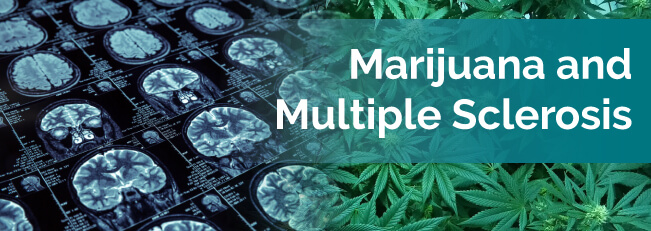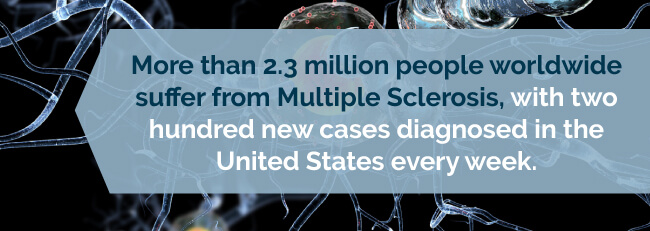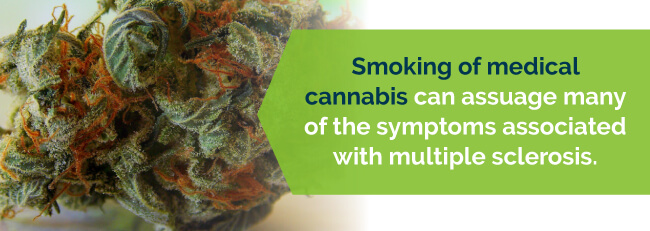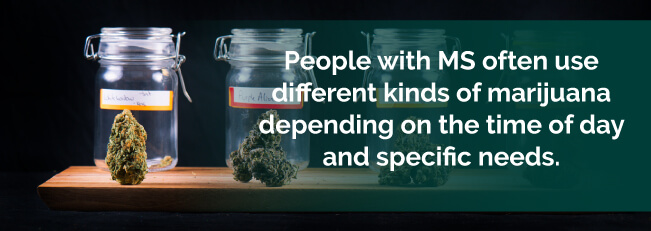
Multiple sclerosis (MS), a debilitating and sometimes fatal disorder of the central nervous system, is the most common debilitating neurologic disease of young people. National Multiple Sclerosis Society (NMSS) estimates suggest more than 2.3 million people worldwide suffer from the disease, with two hundred new cases diagnosed in the United States every week.

While physicians have options to slow the progression of MS, there is currently no cure. For this reason, many people suffering from MS seek out alternative treatments to slow the progression or relieve the symptoms. Medical marijuana for multiple sclerosis is one such alternative that shows promise in combating the symptoms of the disease. Learn more about how cannabis can help to determine if it is a suitable option for you or a loved one.
The central nervous system comprises nerve cells or neurons in the brain and spinal cord. A fatty product called myelin surrounds most nerves in the body. Myelin allows the nerves to send clear electrical impulses faster and more effectively along the neurons. Multiple sclerosis, MS, is an autoimmune disorder which means that the body’s immune system turns against itself. This autoimmune response causes the protective myelin coating, or myelin sheaf, to become inflamed and eventually destroyed in various places along the central nervous system. This destruction of myelin is called de-myelination. This destructive process keeps the neurons from sending effective nerve signals. The signals become slowed, garbled or blocked, causing the symptoms of multiple sclerosis to develop. Symptoms of MS are varied and depend on the location of the myelin damage. Common symptoms are loss of muscle coordination, impaired vision, numbness or tingling sensations in the arms or legs, fatigue and incontinence. This disease can be difficult to diagnose because the symptoms, which can last from days to months, may come and go without any pattern. Learn more below about how medical marijuana can help treat MS.
While having a strong immune system is important to staying healthy, having an overactive immune system can be just as harmful as having a compromised immune system. Due to the variety of symptoms of this disease, many drugs are used to alleviate these symptoms, many with severe health risks.

Smoking of medical cannabis can assuage many of the symptoms associated with multiple sclerosis. The cannabinoid receptors have been scientifically proven to alleviate many of the symptoms that accompany multiple sclerosis. The cannabinoid 1 and cannabinoid 2 (CB1 and CB2) receptors are usually activated by the cannabinoids naturally created by the body, also known as endocannabinoids. However, in order to increase the effects of these receptors via activation, other chemicals (i.e. phytocannabinoids), can also activate these receptors. The CB2 receptors are located on the cells of the immune system.
The anti-inflammatory effects of cannabinoids have much to do with its ability to be an immune suppressant. This is characterized by the fact that when the cannabinoid receptor is activated, it has a stabilizing effect on the voltage-gated channels that influence the severity of inflammatory response. In the case of autoimmune disorders, this can be beneficial in decreasing the progression of the patient’s condition. Multiple Sclerosis can progress differently depending on the severity of the condition, but eventually the wiring of neurons that control essential bodily functions will deteriorate. It is important to understand that medical cannabis is not a cure for this disorder, and it is simply a treatment to alleviate the symptoms of the disease. Nevertheless, cannabis has therapeutic effects for millions of people and doctors should have the freedom to prescribe cannabis to the individuals who find it therapeutic.
Find A Doctor Find A Dispensary
Medical cannabis for multiple sclerosis has some specific effects that relate to the disease. Some of those effects include:
Medical cannabis (often referred to as medical weed or medical pot) is an effective drug that can help MS patients lessen the effects of the disease. Countless case studies, anecdotal reports, scientific studies, surveys and double-blind studies have reported improvement in MS patients treated with medical cannabis and/or cannabinoids for symptoms such as spasticity, muscle spasms, chronic pain, tremor, sexual dysfunction, bowel and bladder dysfunctions, vision dimness, dysfunctions of walking and balance (ataxia) and memory loss.
A 2003 study run by the Department of Microbiology-Immunology at the Northwestern University Medical School stated the following in their abstract titled “Therapeutic potential of cannabinoids in CNS disease”:
“Signaling is mostly inhibitory and suggests a role for cannabinoids as therapeutic agents in CNS disease where inhibition of neurotransmitter release would be beneficial. Anecdotal evidence suggests that patients with disorders such as multiple sclerosis smoke cannabis to relieve disease-related symptoms. Cannabinoids can alleviate tremor and spasticity in animal models of multiple sclerosis, and clinical trials of the use of these compounds for these symptoms are in progress.”
In 2012, a study called MS and Extract of Cannabis (MUSEC) showed promising results in the use of oral cannabis extract in treating muscle stiffness caused by the disease. Participants either received the cannabis extract or a placebo for 12 weeks of treatment, reporting their perceptions of their muscle stiffness before and after. The group that received cannabis reported a significant improvement in muscle stiffness compared to participants who received the placebo. The cannabis extract also seemed to help with pain, spasms and sleep.
A 2011 study published in the European Journal of Neurology showed the use of nabiximols, known as Sativex, an oral spray derived from cannabis, improved spasticity. Participants considered likely to respond well to the treatment took part in a controlled clinical trial. This drug is not currently available in the U.S., although it is available in 15 other countries, with approval for use in 12 other countries.
Research continues in using marijuana for MS, but studies are often challenging due to restrictions by the government and the limited availability of cannabinoids researchers need to conduct the studies.
Right now, nothing can cure MS, but effective treatments help ease the symptoms and slow the progression of the disease. Some patients find marijuana a suitable treatment option to get relief from those symptoms. Weed may help muscle stiffness, spasms, inflammation that contributes to nerve damage, pain, abdominal issues, depression and sleep issues. Minimizing those symptoms eases discomfort and may help the patient handle everyday activities disrupted by the disease.
Finding the best strain of marijuana to treat MS often takes some experimentation and guidance from a marijuana doctor. An expert in the field can use your personal medical history, including the type of MS you have, your usual symptoms and the progression of your disease, to find a strain of cannabis that best fits your needs.
While Sativex has been shown to work well in treating MS symptoms, it is not available in the U.S. Sativex is essentially a pharmaceutical-grade cannabis extract. It uses a 1:1 ratio of activated THC and CBD. Since you cannot get Sativex in the U.S., you may consider some strains of weed with similar profiles.
The option with perhaps the closest resemblance to the drug is One to One. Other suitable options that may help treat MS symptoms include:
Keep in mind Permafrost has a high level of THC, which is the component that causes the high feeling often associated with weed. If you don’t want a strong high feeling, you may want to choose a different strain.

People with MS often use different kinds of marijuana depending on the time of day and specific needs. For example, heavy Indica strains can have a sleepy effect, which is ideal for bedtime, particularly for those patients who have sleep difficulties.
Once you decide on the best strain to treat your MS symptoms, you need to decide how to ingest the cannabis. Each method has pros and cons with differences in the side effects, how fast it works and how long you feel the effects.
Consider these methods of taking medical marijuana for MS:
One drawback to using edibles is the longer lead time before the marijuana takes effect. You may wait anywhere from 30 minutes to a few hours to feel the effects. However, those effects tend to last much longer than they do with smoking or vaping. For this reason, some people like to use edibles before bed, so the marijuana lasts longer through the night.
Many people try a combination of methods when using cannabis to treat MS. For example, when you want immediate relief from an MS symptom, you might choose to smoke or vape the marijuana. When you want a longer-lasting effect, you might opt for an edible. Experimenting with different methods helps you create a balanced approach to treating your MS symptoms with marijuana.
While marijuana is a natural treatment option, it’s important to understand the potential side effects. Most side effects are generally considered mild, low-risk issues. When compared to the potential for liver damage, blood pressures issues, heart rate fluctuations, hair loss and increased cancer rates associated with traditional MS treatments, the side effects of cannabis for MS seem much more manageable.
Patients using weed to treat MS may experience the following side effects:
Many marijuana states have approved marijuana use for the treatment of multiple sclerosis. Medical cannabis is an affordable, natural alternative medicine that has helped thousands of multiple sclerosis patients. If you or someone you love suffers from MS and you’d like to find out if medical marijuana is the right treatment, we can help. We can connect you with hundreds of quality marijuana doctors across the country in all legal marijuana states and ensure you are in compliance with your state laws. Book an appointment today and let us help improve your quality of life!
For more information about how cannabis can be used to treat Multiple Sclerosis, check out our resources:
Find A Doctor Find A Dispensary
Multiple sclerosis is an autoimmune disease where the body’s immune system mistakenly attacks healthy tissue in the central nervous system, primarily the brain and spinal cord. Specifically, the disease causes the immune system to attack myelin, a fatty substance forming a protective, insulating sheath on nerve fibers. Scar tissue, known as sclerosis, forms due to the myelin damage.
Over time, the damage can spread from the myelin to the nerve fibers. The damage disrupts or distorts the nerve impulses in the central nervous system, which causes a variety of symptoms, primarily pain and difficulty in controlling the body.
The symptoms of MS depend on the nerves damaged and the extent of that damage. They tend to vary from one patient to the next. Additionally, each person’s symptoms change over the course of the disease. In the beginning of the disease, the symptoms may be mild enough that the patient doesn’t need any treatment. As it progresses, those symptoms become more pronounced or last for longer periods.
Some potential symptoms of MS include:
MS affects the brain and spinal cord, meaning that both the higher functioning and basic processes that keep the patient alive are affected. While there are different types of MS, the condition tends to deteriorate over time to the point that the patient can’t take care of themselves. MS is often a disabling disease. Some patients eventually lose the ability to speak and walk.
The exact cause of MS is unknown, but researchers believe individuals who develop MS are genetically susceptible to the condition. Multiple sclerosis is not considered a hereditary disease, but people with a parent or sibling with MS have a higher risk of developing it. Environmental factors may actually trigger the disease in those individuals. Other researchers believe certain viruses early in life, such as Epstein-Barr, could trigger MS later.

While kids and older adults can be diagnosed with MS, NMSS says the disease is usually diagnosed in patients between the ages of 20 and 50. Women are two to three times more likely to develop MS than men. These statistics could indicate hormones affect the development of the disease. While most ethnic groups are susceptible to MS, the highest rates seem to occur in Caucasians with northern European ancestry.
Location may also play a role in developing the disease. There tend to be fewer incidents of MS in areas closer to the equator, suggesting vitamin D could play a role in the disease. People living in climates near the equator may have more naturally created vitamin D than those living in areas away from the equator. A person with a different autoimmune disorder, such as Type 1 diabetes or thyroid disease, may also have a slightly higher risk of developing MS.
Diagnosis isn’t always easy as there are no tests to specifically look for MS. The typically MS diagnosis occurs after eliminating the possibility of other medical conditions that could cause the symptoms the patient experiences. These evaluations may include a medical history, physical exam and blood tests. If MS is suspected, additional testing may be helpful in looking for indicators of the disease. These tests may include:
There are different types of MS, each with different symptoms and progressions. Understanding the type of MS you have helps predict the progression, severity and best potential treatments:
There is no cure for multiple sclerosis, so researchers and scientists aim to slow the disease’s progression and create better treatments. Current medications for MS may have negative side effects such as flu-like symptoms (such as fever, chills, fatigue, and muscle aches), allergic reactions, headaches, tiredness and joint pain. Others can even damage your heart or cause a serious and life-threatening disease called PML.
Treatments for MS have one of three main goals:
Corticosteroids are commonly used to treat MS attacks. Oral prednisone and intravenous methylprednisolone are two examples. The purpose of these drugs is to minimize nerve inflammation. Corticosteroids have several potential side effects, including:
Plasma exchange, also called plasmapheresis, is another treatment option, particularly for those with new, severe symptoms that don’t respond to steroid treatment. In this treatment option, the plasma portion of the blood is separated from the blood cells. Albumin, a protein solution, mixes with the blood cells before returning to the body.
Several options may slow the progression of MS in patients with relapsing-remitting MS, but many of those treatments come with potentially serious side effects and health risks. Some of the options include:
Additional treatments may address specific symptoms. For example, your doctor may prescribe medications to treat depression, pain or bladder control problems. Muscle relaxants are sometimes prescribed for muscle stiffness or spasms.
.